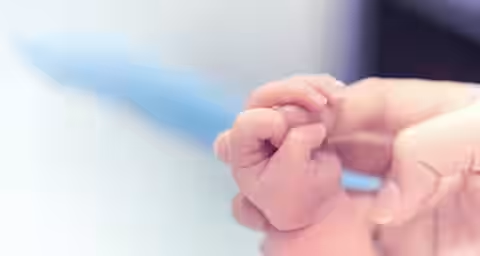We specialise in Erb's palsy claims and have recovered substantial damages for clients. We are recommended by the Erb's Palsy Group, the only UK based organisation supporting families affected.
Brachial plexus palsy, known as Erb’s palsy, is a condition mainly caused by birth trauma, generally excessive traction on a baby's head, neck or shoulders during birth and delivery, damaging the nerves in the neck.
If a baby's shoulders become trapped in the birth canal, it can compress the chest and umbilical cord, restricting the baby breathing. Erb's palsy can result.
Birth injury
Any inappropriate traction applied during delivery can result in strain of the brachial plexus nerves. Claims for compensation usually fall into two categories:
- Failure to arrange a caesarean section in cases where shoulder dystocia should have been anticipated.
- Negligent handling of shoulder dystocia as a result of failure to follow established procedures.
Brachial plexus
If medical staff uses excessive force to attempt to free and deliver a baby, it can cause nerve damage to the baby's brachial plexus.
The brachial plexus is a large network of nerves running from the neck to the arm, managing movement and feeling in the arm and hand. Erb's palsy can affect any or all of those five primary nerves.
Paralysis can be partial or complete. The damage to each nerve can range from bruising to tearing. Some injuries recover on their own, but some babies are left with a permanent disability that requires specialist treatment.
Signs of Erb’s palsy
A classic sign is an elbow which does not bend and a hand held in a 'waiters tip' (turning backwards) position.
When a nerve is damaged, weakness or paralysis can affect the arm and hand. Signs may also include a limp hand and possible associated Horner’s syndrome where the eyelid droops and the pupil is smaller on the side of the weak arm.
Babies may also have an associated Torticollis, where they face away from their affected arm and cannot face forward easily.
A nerve that has been severely damaged but remains connected may heal, but scar tissue can form at the site of injury. This scar tissue may stop the electrical messages that run through the nerves, preventing them reaching the muscles. A nerve that is completely pulled apart (avulsion) cannot repair itself, meaning the muscles it supplies are paralysed.
Children affected can have an operation to help the nerve and restore some function to the muscle, but will often be left with some weakness in the arm. Around one-in-ten children need surgery to help improve function of the arm.
Erb's palsy claim
A claim can only be pursued if Erb’s palsy was the result of medical negligence in the management of the pregnancy and/or delivery. Other factors relevant to a claim include:
- Failure to estimate a large baby's weight and size prior to delivery (particularly if there are clinical signs indicating a large baby and/or a prior history of previous pregnancies with large babies).
- Failure to perform a caesarean section when there are clinical indications to do so.
- Failure to recognise and treat maternal diabetes (maternal diabetes often increases the risk of having a large baby).
- Failure to follow protocols for shoulder dystocia (doctors should perform certain manoeuvres if a baby is stuck in the birth canal).
- Applying unnecessary and excessive traction or force during delivery, resulting in injury.
Our award-winning team believes in putting clients first. We are dedicated to achieving the best results possible and pride ourselves on our sensitive approach. Any of our Erb's palsy claims experts below will be pleased to discuss your case and offer free advice over the phone.














